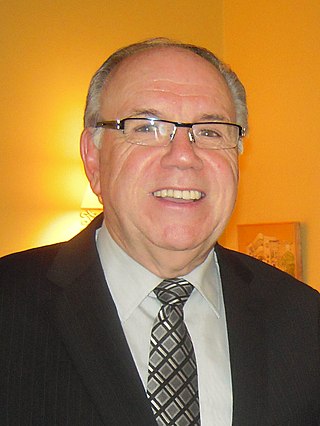Related Research Articles

The Action démocratique du Québec, commonly referred to as the ADQ, was a right-wing populist and conservative provincial political party in Quebec, Canada. On the sovereignty question, it defined itself as autonomist; it had support from nationalists and federalists. Its members were referred to as adéquistes, a name derived from the French pronunciation of the initials 'ADQ'.

Mario Dumont is a Canadian television personality and former politician in Quebec, Canada. He was a Member of the National Assembly of Quebec (MNA), and the leader of the Action démocratique du Québec (ADQ), from 1994 to 2009. After the 2007 Quebec election, Dumont obtained the post of Leader of the Opposition in the National Assembly.

Gatineau Park is a federal park located in the Outaouais region of Quebec, Canada. Administered by the National Capital Commission as part of the National Capital Region, Gatineau Park is a 361 square kilometres (139 sq mi) wedge of land extending north and west from the city of Gatineau. With a perimeter of 179.2 kilometres (111.3 mi), the park includes parts of the municipalities of Chelsea, Pontiac, La Pêche, and the City of Gatineau. The main entrance to the park is 4 kilometres (2.5 mi) north of downtown Ottawa, Ontario.
Louis Plamondon is a Canadian politician who served as the interim speaker of the House of Commons of Canada from September 27 to October 3, 2023. A member of the Bloc Québécois, he has represented Bécancour—Nicolet—Saurel since 1984. As the longest-serving current member of the House of Commons, Plamondon is Dean of the House, and holds the record as Canada's longest-serving dean.

The Rapibus is a bus rapid transit system for the Société de Transport de l'Outaouais (STO) in the city of Gatineau, Quebec. Construction was completed in the summer of 2013 with service beginning in the fall. The Rapibus aims to speed up the service for commuters in growing sub-divisions in the northern and eastern areas of the city by alleviating the congestion on key arteries currently served by bus-designated lanes. A direct link to Ottawa is included.
Sylvain Simard is a politician and academic based in the Canadian province of Quebec. He represented Richelieu in the National Assembly of Quebec from 1994 to 2012, and was a cabinet minister in the governments of Lucien Bouchard and Bernard Landry. Simard is a member of the Parti Québécois (PQ).

Benoît Pelletier was a Canadian lawyer, academic, and politician in the province of Quebec.

Jean-Pierre Charbonneau is a journalist and a former Quebec politician. He was the Quebec MNA member under the Parti Québécois for the provincial ridings of Borduas and Verchères in the Montérégie region.

Roch Cholette is a Canadian public accountant and a former municipal and provincial politician in Quebec, Canada.
Stéphanie Vallée is a French-Canadian politician, lawyer and negotiator in Quebec. She was a member of the National Assembly of Quebec (MNA) for the provincial riding of Gatineau from 2007 to 2018, as a member of the Quebec Liberal Party. Since 2014 she served as Minister of Justice for Quebec, but decided to leave electoral politics as of the 2018 provincial general election.
Yvon Lafrance was a Canadian politician in Quebec, and was the Member of the National Assembly for the electoral district of Iberville.
Michel Després is an administrator, consultant and a former Quebec politician. He was the former MNA member of the former riding of Limoilou from 1985 to 1994 and 1998 to 2003 and the former member of the riding of Jean-Lesage from 2003 and 2007 when he was defeated. He represented the Quebec Liberal Party during all his political career.
Pierre Paradis is a politician in the Canadian province of Quebec. He represented Brome-Missisquoi in the National Assembly of Quebec from 1980 to 2018. A member of the Liberal Party, he served as a cabinet minister in the governments of Robert Bourassa, Daniel Johnson Jr. and Philippe Couillard.
Claire Vaive was a politician in Quebec, Canada. She was the member of National Assembly of Quebec from 1994 to 1998 and was a councillor for Gatineau City Council for 14 years.
The Action démocratique du Québec (ADQ) party ran a full slate of 125 candidates in the 2007 provincial election and elected forty-one members to become the official opposition in the National Assembly of Quebec. Many of the party's candidates have their own biography pages; information about others may be found here.
Robert Benoit is a Canadian politician in the province of Quebec. He served in the National Assembly of Quebec from 1989 to 2003 as a member of the Quebec Liberal Party.
Yves Blais was a politician in the Canadian province of Quebec. He served in National Assembly of Quebec from 1981 to 1998 as a member of the Parti Québécois (PQ).

Gaétan Cousineau is an administrator and former politician in the Canadian province of Quebec. He was the mayor of Gatineau from 1983 to 1988 and is now president of the Commission des droits de la personne et des droits de la jeunesse.

John Ciaccia was a Canadian politician who was provincial cabinet minister from Montreal, Quebec. Ciaccia served as a member of the National Assembly of Quebec from 1973 to 1998, representing the Mount Royal riding for the Quebec Liberal Party. He occupied various posts in the cabinets of Liberal premiers Robert Bourassa, and Daniel Johnson Jr., such as minister of Energy and Natural Resources, International Affairs, Native Affairs, and Immigration and Cultural Communities. At his resignation, Ciaccia was the longest-serving member of the Assembly. Ciaccia gained international attention for his efforts in negotiating the end of the Oka Crisis alongside his federal counterpart, Tom Siddon, in 1990. Former Quebec Premier Jean Charest described Ciaccia's political career as having "revolutionized relations with the native people and cultural communities of Quebec by always favouring an approach marked by respect."
Marcel Parent was a Canadian politician in Montreal, Quebec. He was chair of the Montreal Catholic School Commission (MCSC) from 1983 to 1984, a Liberal member of the National Assembly of Quebec from 1984 to 1998, and a member of the Montreal city council from 2001 to 2009. Parent died in Montreal on August 22, 2024, at the age of 92.
References
- ↑ "Biography". Dictionnaire des parlementaires du Québec de 1792 à nos jours (in French). National Assembly of Quebec.
- ↑ "Two seek Liberal nod in byelection," Ottawa Citizen, 20 February 1989, C2; "Liberals choose municipal clerk," Ottawa Citizen, 2 March 1989, C3. The nomination vote was 456 to 167 for LeSage over rival candidate Pierre-Louis Lapointe.
- ↑ He was quoted as saying, "Do we want to put development of the region in jeopardy for the sake of frogs and birds?" See "Hull city clerk is seeking Liberal nomination in Hull," Ottawa Citizen, 9 December 1988, C1.
- ↑ George Kalogerakis, "Grits hope to repeat landslide," Ottawa Citizen, 19 September 1989, C3.
- ↑ Christine Tierney, "DISGRUNTLED QUEBECERS BAULK AT QUEEN'S VISIT," Reuters News, 29 June 1990.
- ↑ "MNA Williams not included on constitutional committees," Montreal Gazette, 5 June 1991, A5.
- ↑ Howard Williams, "If Quebec secedes from Canada, some want Hull to secede from Quebec," Agence France-Presse, 11 August 1994.
- ↑ "Outaouais will leave sovereign Quebec, LeSage cautions," Ottawa Citizen, 8 November 1993, A3.
- ↑ Mike Shahin, "Premier hints casino safe bet," Ottawa Citizen, 4 March 1994, B1; Daniel Drolet, "PQ win leaves Outaouais casino in limbo," Ottawa Citizen, 15 September 1994, B5.
- ↑ Philip Authier, "Less-critical portfolios given to anglo MNAs in shadow cabinet," Montreal Gazette, 3 November 1994, A7.
- ↑ "Charest likely to go to Quebec, Tory House leader predicts," Ottawa Citizen, 15 March 1998, A1.